
Godzilla is a fictional monster, or kaiju, that debuted in the eponymous 1954 film, directed and co-written by Ishirō Honda. The character has since become an international pop culture icon, appearing in various media: 33 Japanese films produced by Toho Co., Ltd., five American films and numerous video games, novels, comic books and television shows. Godzilla has been dubbed the "King of the Monsters", an epithet first used in Godzilla, King of the Monsters! (1956), the American localization of the 1954 film.
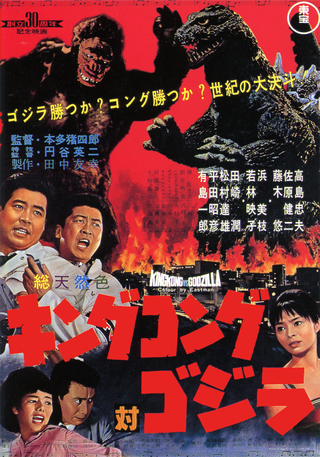
King Kong vs. Godzilla is a 1962 Japanese kaiju film directed by Ishirō Honda, with special effects by Eiji Tsuburaya. Produced and distributed by Toho Co., Ltd, it is the third film in both the Godzilla and King Kong franchises, as well as the first Toho-produced film featuring King Kong. It is also the first time that each character appeared on film in color and widescreen. The film stars Tadao Takashima, Kenji Sahara, Yū Fujiki, Ichirō Arishima, and Mie Hama, with Shoichi Hirose as King Kong and Haruo Nakajima as Godzilla. In the film, Godzilla is reawakened by an American submarine and a pharmaceutical company captures King Kong for promotional uses, which culminate in a battle with Godzilla on Mount Fuji.
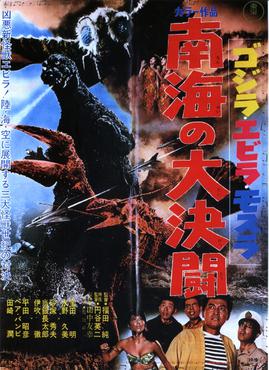
Ebirah, Horror of the Deep is a 1966 Japanese kaiju film directed by Jun Fukuda and produced and distributed by Toho Co., Ltd. The film stars Akira Takarada, Kumi Mizuno, Akihiko Hirata and Eisei Amamoto, and features the fictional monster characters Godzilla, Mothra, and Ebirah. It is the seventh film in the Godzilla franchise, and features special effects by Sadamasa Arikawa, under the supervision of Eiji Tsuburaya. In the film, Godzilla and Ebirah are portrayed by Haruo Nakajima and Hiroshi Sekita, respectively.
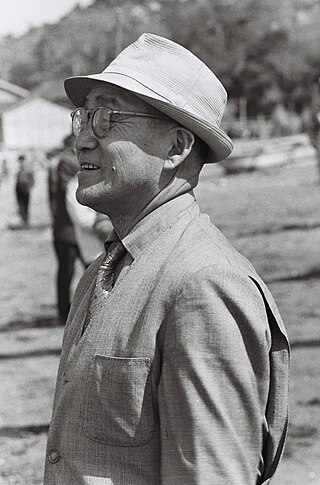
Eiji Tsuburaya was a Japanese special effects director, filmmaker, and cinematographer. A co-creator of the Godzilla and Ultraman franchises, he is considered one of the most important and influential figures in the history of cinema. Known as the "Father of Tokusatsu", he pioneered Japan's special effects industry, introducing several technological developments in film productions. In a career spanning five decades, Tsuburaya worked on approximately 250 films—including globally renowned features directed by Ishirō Honda, Hiroshi Inagaki, and Akira Kurosawa—and earned six Japan Technical Awards.

Kaiju is a Japanese term that is commonly associated with media involving giant monsters and monster movies. A subgenre of science fiction, it was created by Eiji Tsuburaya and Ishirō Honda. The word can also refer to the giant monsters themselves, which are usually depicted attacking major cities and battling either the military or other monsters.

Willis Harold O'Brien, known as Obie O'Brien, was an American motion picture special effects and stop-motion animation pioneer, who according to ASIFA-Hollywood "was responsible for some of the best-known images in cinema history," and is best remembered for his work on The Lost World (1925), King Kong (1933), The Last Days of Pompeii (1935) and Mighty Joe Young (1949), for which he won the 1950 Academy Award for Best Visual Effects.
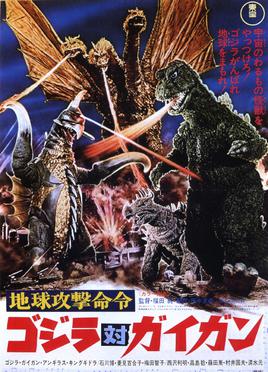
Godzilla vs. Gigan, is a 1972 Japanese kaiju film directed by Jun Fukuda, written by Shinichi Sekizawa, and produced by Tomoyuki Tanaka, with special effects by Teruyoshi Nakano. Distributed by Toho and produced under their effects-based subsidiary Toho-Eizo, it is the 12th film in the Godzilla franchise, and features the fictional monster characters Godzilla, Gigan, Anguirus, and King Ghidorah. The film stars Hiroshi Ishikawa, Yuriko Hishimi, Tomoko Umeda, and Minoru Takashima, alongside Haruo Nakajima as Godzilla, Kenpachiro Satsuma as Gigan, Koetsu Omiya as Anguirus, and Kanta Ina as King Ghidorah. It is the last film in which Godzilla was portrayed by Nakajima after playing the character since the original 1954 film; he subsequently retired from suit acting.

Godzilla vs. Hedorah is a 1971 Japanese kaiju film directed by Yoshimitsu Banno, with special effects by Teruyoshi Nakano. Produced and distributed by Toho Co., Ltd., it is the 11th film in the Godzilla franchise, and features the fictional monster characters Godzilla and Hedorah. The film stars Akira Yamauchi, Toshie Kimura, and Hiroyuki Kawase, and features Haruo Nakajima as Godzilla and Kenpachiro Satsuma as Hedorah. Satsuma would go on to portray Godzilla in later Godzilla films.

Godzilla vs. Mechagodzilla II, is a 1993 Japanese kaiju film directed by Takao Okawara, written by Wataru Mimura, and produced by Shōgo Tomiyama. Produced and distributed by Toho Studios, it is the 20th film in the Godzilla franchise, as well as the fifth film to be released during the franchise's Heisei era. The film features the fictional monster character Godzilla, along with Baby Godzilla and the mecha character Mechagodzilla. Despite its English title, the film is not a sequel to the 1974 film Godzilla vs. Mechagodzilla.
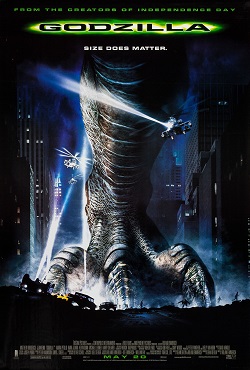
Godzilla is a 1998 American monster film directed and co-written by Roland Emmerich. Produced by Centropolis Entertainment, Fried Films, and Independent Pictures, and distributed by TriStar Pictures, it is a reboot of Toho Co., Ltd.'s Godzilla franchise. It is also the 23rd film in the franchise and the first Godzilla film to be completely produced by a Hollywood studio. The film stars Matthew Broderick, Jean Reno, Maria Pitillo, Hank Azaria, Kevin Dunn, Michael Lerner, and Harry Shearer. The film is dedicated to Tomoyuki Tanaka, the co-creator and producer of various Godzilla films, who died in April 1997. In the film, authorities investigate and battle a giant monster who migrates to New York City to nest its young.

King Kong is a fictional giant monster resembling a gorilla, who has appeared in various media since 1933. He has been dubbed The Eighth Wonder of the World, a phrase commonly used within the franchise. His first appearance was in the novelization of the 1933 film King Kong from RKO Pictures, with the film premiering a little over two months later.

Frankenstein vs. Baragon is a 1965 kaiju film directed by Ishirō Honda, with special effects by Eiji Tsuburaya. The film stars Nick Adams, Kumi Mizuno and Tadao Takashima, with Koji Furuhata as Frankenstein and Haruo Nakajima as Baragon. An international co-production of Japan and the United States; it was the first collaboration between Toho Co., Ltd and Henry G. Saperstein. In the film, scientists investigate the origins of a mysterious boy and his resistance to radiation that makes him grow to monstrous size, while a second monster ravages the countryside.

King Kong Escapes is a 1967 kaiju film directed by Ishirō Honda, with special effects by Eiji Tsuburaya. The film was a Japanese–American co-production between Toho and Rankin/Bass, and stars Rhodes Reason, Linda Miller, Akira Takarada, Mie Hama, Eisei Amamoto, with Haruo Nakajima as King Kong and Hiroshi Sekita as Mechani-Kong and Gorosaurus. The film is loosely based on Rankin/Bass' series, The King Kong Show, and was the second and final Toho-produced film featuring King Kong. King Kong Escapes was released in Japan on July 22, 1967, and released in the United States on June 19, 1968. It is the fourth entry in the King Kong franchise.

Godzilla is a Japanese monster, or kaiju, media franchise consisting of films, television series, novels, comic books, video games, and other merchandise. The franchise is centered on the fictional kaiju Godzilla, a prehistoric reptilian monster awakened and powered by nuclear radiation. The franchise is recognized by the Guinness World Records as the "longest continuously running film franchise", having been in ongoing production since 1954, with several hiatuses of varying lengths. The film franchise consists of 38 films; 33 Japanese films produced and distributed by Toho Co., Ltd. and five American films: one produced by TriStar Pictures and four produced by Legendary Pictures.

A monster movie, monster film, creature feature or giant monster film is a film that focuses on one or more characters struggling to survive attacks by one or more antagonistic monsters, often abnormally large ones. The film may also fall under the horror, comedy, fantasy, or science fiction genres. Monster movies originated with adaptations of horror folklore and literature. Typically, movie monsters differ from more traditional antagonists in that many exist due to circumstances beyond their control; their actions are not entirely based on choice, potentially making them objects of sympathy to film viewers.

Godzilla vs. Kong is a 2021 American monster film directed by Adam Wingard. Produced by Legendary Pictures and distributed by Warner Bros. Pictures, it is a sequel to Kong: Skull Island (2017) and Godzilla: King of the Monsters (2019), and is the fourth film in the MonsterVerse. It is also the 36th film in the Godzilla franchise, the 12th film in the King Kong franchise, and the fourth Godzilla film to be completely produced by an American film studio. The film stars Alexander Skarsgård, Millie Bobby Brown, Rebecca Hall, Brian Tyree Henry, Shun Oguri, Eiza González, Julian Dennison, Lance Reddick, Kyle Chandler, and Demián Bichir. Brown and Chandler reprise their roles from the previous Godzilla film. In the film, Kong clashes with Godzilla after humans move the ape from Skull Island to the Hollow Earth, homeworld of the monsters known as "Titans", to retrieve a power source for a secret weapon intended to stop Godzilla's mysterious attacks.

The MonsterVerse is an American multimedia franchise and shared fictional universe featuring Godzilla, King Kong, and other monster characters owned and created by Toho Co., Ltd. The franchise is produced by Legendary Pictures and co-produced and distributed by Warner Bros. Pictures, and consists of five films and two television series. The franchise received a generally positive critical reception and has grossed $1.950 billion worldwide at the box office.

King Kong is an American monster media franchise that consists of thirteen films, as well as television, novels, comic books, video games, attractions, and other merchandise. The franchise is centered on King Kong, a giant ape living on a primordial island inhabited by prehistoric creatures. The original film King Kong was co-directed by Merian C. Cooper and Ernest B. Schoedsack and was released on March 2, 1933; it was a box office success, despite opening during the Great Depression. The film's stop motion effects by Willis H. O'Brien revolutionized special effects, leaving a lasting impact on the film industry worldwide.

Godzilla is a fictional monster, or kaiju, in Legendary Pictures' MonsterVerse media franchise and based on Toho Co., Ltd.'s character of the same name. The character first appeared in Godzilla (2014), directed by Gareth Edwards. This incarnation of Godzilla is depicted as the sole survivor of a prehistoric superspecies, theorized by Ishirō Serizawa, acting as a force of nature that maintains balance. The character was initially designed by Matt Allsopp, modeled after the Toho version. It is the third incarnation of Godzilla to be created by an American studio, after Hanna-Barbera's 1978 animated series Godzilla and TriStar Pictures' 1998 film Godzilla, and overall the tenth onscreen incarnation of the iconic character.
Godzilla x Kong: The New Empire is an upcoming American monster film directed by Adam Wingard. Produced by Legendary Pictures and distributed by Warner Bros. Pictures, it is a sequel to Godzilla vs. Kong (2021), and the seventh installment and fifth film in the MonsterVerse. It is also the 38th film of the Godzilla franchise, the 13th film in the King Kong franchise, and the fifth Godzilla film to be completely produced by an American film studio. The film stars Dan Stevens, Rebecca Hall, Brian Tyree Henry, Kaylee Hottle and Fala Chen. Hall, Henry and Hottle reprise their roles from the previous film.



















